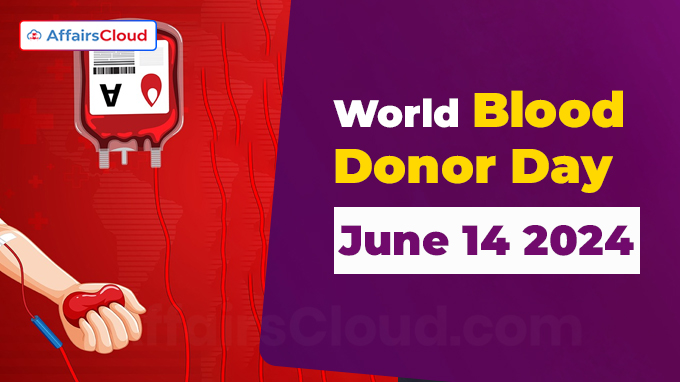 World Blood Donor Day (WBDD) is annually observed across the globe on 14 June to raise awareness of the need for safe blood and blood products and express gratitude to voluntary, unpaid blood donors.
World Blood Donor Day (WBDD) is annually observed across the globe on 14 June to raise awareness of the need for safe blood and blood products and express gratitude to voluntary, unpaid blood donors.
- The annubal oservance of WBDD is led by the World Health Organisation (WHO).
- 14 June 2024 commemorates the 20th anniversary of WBDD.
The 2024 theme/slogan of WBDD is, “20 years of celebrating giving: thank you, blood donors!”
- The host country of the WBDD 2024 is Perú. The events are organised together with the Ministry of Health of Peru.
Note:
i.Each year, WBDD’s campaign theme honours the impact of blood donations on patients and donors of blood donors, recognising the selfless act of donating blood, plasma, and platelet to help strangers in need.
ii.A blood product is any therapeutic substance derived from human blood, including whole blood and other blood components for transfusion, and Plasma-Derived Medicinal Products (PDMPs).
Objectives of WBDD 2024:
i.To thank and acknowledge millions of voluntary blood donors for their contributions to global health and well-being.
ii.To highlight the successes and challenges of the national blood programs, and share best practices and lessons learned.
iii.To stress the importance of regular, unpaid blood donations to achieve universal access to safe blood transfusions.
iv.To encourage regular blood donation among youth and the general public and increase the diversity and sustainability of the blood donor pool.
Background:
i.The WBDD was established by the WHO in 2004 to mark the birthday anniversary of an Austrian-American biologist and physician Karl Landsteiner (1868–1943), who discovered the ABO blood groups in 1901.
- The 1st WBDD was observed on 14 June 2004.
ii.Following the successful 1st observance, the 58th World Health Assembly (WHA) in 2005 adopted the resolution WHA58.13 titled, “Blood safety: proposal to establish World Blood Donor Day,” and agreed to celebrate WBDD on 14 June each year.
- WBDD is observed as an integral part of the national blood donor recruitment program.
Note: The 1st WBDD was organised by the WHO.the International Federation of Red Cross and Red Crescent Societies (IFRC), the International Federation of Blood Donor Organizations (IFBDO), and the International Society of Blood Transfusion (ISBT).
Karl Landsteiner:
i.Karl Landsteiner was born on 14 June 1868 in Vienna, Austrian Empire (now Austria). He was considered to be the “founder” of modern blood transfusion.
ii.He was awarded the Nobel Prize in Physiology or Medicine in 1930 “for his discovery of human blood groups.”
iii.He passed away on 26 June 1943 in New York, the United States of America (USA).
WHO’s Blood Safety Measures:
i.The WHO established the Global Database for Blood Safety(GDBS) in 1998 to assess blood transfusion services.
iii.The WHO’s South-East Asia Region (SEAR) shows significant progress in blood safety, recording around 22.3 million whole blood donations, with 100% screened for Transfusion-Transmitted Infections (TTI) and ABO grouping.
Key Facts:
i.Nearly 800 women die daily from pregnancy and childbirth complications. Severe Bleeding is the leading cause of maternal death and can kill a healthy woman within 2 hours if left untreated.
ii.Sub-Saharan Africa, has the highest maternal mortality rate in the world, with 510 deaths per 100,000 live births, and also has the lowest blood donation rates.
iii.According to the WHO’s survey on blood safety and availability, 40 African countries collect less than 10 blood donations per 1,000 population annually.
- Of these, 25 countries collect less than half the blood that they need to meet transfusion requirements.
iv.High-income countries collect around 35 donations per 1000 population per year.
v.Currently, 73 countries collect more than 90% of their blood supply from voluntary unpaid blood donors (38- high-income countries, 26- middle-income countries, and 9- low-income countries).
vi.About 108 million blood donations are collected worldwide annually, with a0lmost half from high-income countries, home to 15% of the world’s population.
About World Health Organisation (WHO):
Director General– Dr Tedros Adhanom Ghebreyesus
Headquarters– Geneva, Switzerland
Established – 1948




